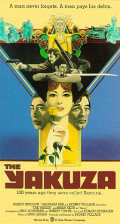
Directed by
Sydney Pollack
108 minutes
Rated M
Reviewed by
Bernard Hemingway

The Yakuza
Sydney Pollack’s film has a strangely anachronistic quality, looking forward to the choreographed violence of the Quentin Tarantino school of pulp fiction yet played out largely within the measured conventions of Hollywood filmmaking of at least a decade earlier, an approach reinforced by the casting of Robert Mitchum in the lead.
Mitchum plays Kilmer, a retired cop-cum-private eye-cum-freewheeler who is engaged by an old war buddy to go to Japan to rescue the latter’s daughter who is being held by the yakuza as a guarantee against a shipment of guns that he, the old buddy (Herb Edelman), did not deliver. Kilmer who was a member of the American occupying forces after the war, knows a yakuza, Tanaka Ken (Takakura Ken, a leading star of the Japanese yakuza movie genre of the time) who is in his debt because he (Kilmer) saved his (the yakuza’s) sister from incarceration as a black marketeer.
There’s more to the plot and that’s part of the problem with the film – it’s rather difficult to follow with all sorts of twists and turns. There’s some voice-over narration to help out but this is countered by the fact that the English-speaking Japanese actors have heavy accents and it's easy to miss what they are saying. The broad strokes, which are about manly old school codes of honour that transcend good guys and bad guys, are, however, clear enough.
All this is good material for an action crime thriller but it tends to be weighed down by its own reasonableness both at the level of convoluted, exegetical script which was by Paul Schrader and Robert Towne from an original story by Leonard Schrader and directorially, which in hindsight deprives the film of the vitality that has become a staple characteristic of the genre (although the revenge sequence towards the end of the film is a good as anything the next generation has done). The casting is also questionable with Tanaka Ken, who was 44 at the time, way too young to have been a soldier in WWII and the principal Japanese actors seemingly chosen because of their more Westernized features than any acting skill. Hence the anachronistic feel of the film which recalls the self-consciously “cross-cultural” themes of post-war Hollywood which tended to fetished “Oriental” customs and mores.
Made at a time when Coppola, Friedkin, Scorsese et al were introducing a new kind of realism to the crime genre it is little surprise that the film did not do well at the box office although it deserves credit as an early example of the influence of Asian genre film on American film makers.
Want something different?





